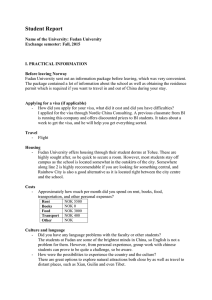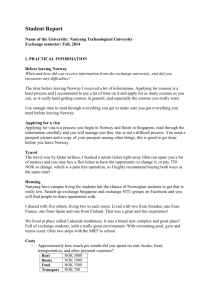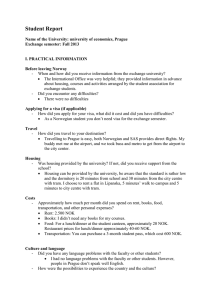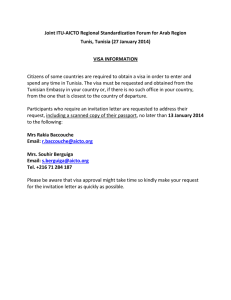Student Report, St. Petersburg.
advertisement
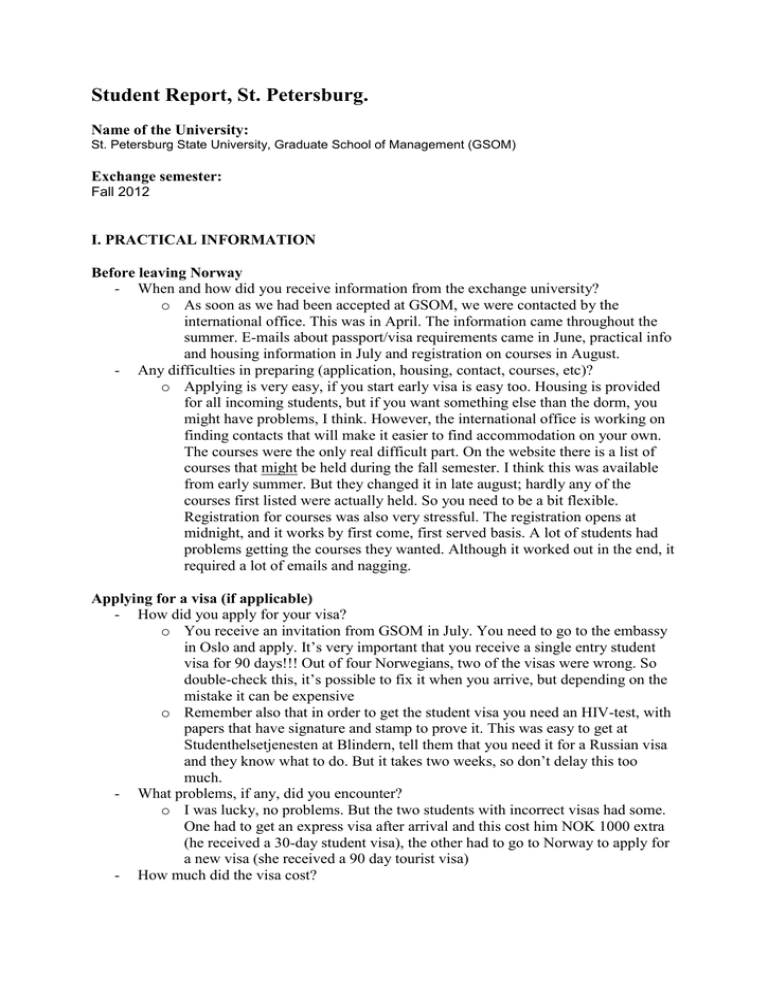
Student Report, St. Petersburg. Name of the University: St. Petersburg State University, Graduate School of Management (GSOM) Exchange semester: Fall 2012 I. PRACTICAL INFORMATION Before leaving Norway - When and how did you receive information from the exchange university? o As soon as we had been accepted at GSOM, we were contacted by the international office. This was in April. The information came throughout the summer. E-mails about passport/visa requirements came in June, practical info and housing information in July and registration on courses in August. - Any difficulties in preparing (application, housing, contact, courses, etc)? o Applying is very easy, if you start early visa is easy too. Housing is provided for all incoming students, but if you want something else than the dorm, you might have problems, I think. However, the international office is working on finding contacts that will make it easier to find accommodation on your own. The courses were the only real difficult part. On the website there is a list of courses that might be held during the fall semester. I think this was available from early summer. But they changed it in late august; hardly any of the courses first listed were actually held. So you need to be a bit flexible. Registration for courses was also very stressful. The registration opens at midnight, and it works by first come, first served basis. A lot of students had problems getting the courses they wanted. Although it worked out in the end, it required a lot of emails and nagging. Applying for a visa (if applicable) - How did you apply for your visa? o You receive an invitation from GSOM in July. You need to go to the embassy in Oslo and apply. It’s very important that you receive a single entry student visa for 90 days!!! Out of four Norwegians, two of the visas were wrong. So double-check this, it’s possible to fix it when you arrive, but depending on the mistake it can be expensive o Remember also that in order to get the student visa you need an HIV-test, with papers that have signature and stamp to prove it. This was easy to get at Studenthelsetjenesten at Blindern, tell them that you need it for a Russian visa and they know what to do. But it takes two weeks, so don’t delay this too much. - What problems, if any, did you encounter? o I was lucky, no problems. But the two students with incorrect visas had some. One had to get an express visa after arrival and this cost him NOK 1000 extra (he received a 30-day student visa), the other had to go to Norway to apply for a new visa (she received a 90 day tourist visa) - How much did the visa cost? o The student visa is supposed to be free, I didn’t pay. I think it might have something to do about you taking Russian lessons. So if ask, say yes. You will be offered free Russian classes + a crash course. Travel - How did you travel to your destination? Any problems? o I travelled with Norwegian, direct flight. A 9h delay on the trip there, no problems going back. Price was around NOK 1300. Housing - Was housing provided by the university, or did you have to find your own housing? o Housing is offered. NOK 700 per month. - What support did you receive from the school in locating housing? o If you want your own housing, they might send you the information from the previous students, but I’m not sure. - Any special issues or good ideas for prospective students? o The dorm is located 20 min walk away from Lenta, a super marked with an ok selection of kitchen equipment. No need to go to IKEA. And Lenta is cheaper. o The rooms at the dorm are distributed randomly. So you can’t choose if you get a nice apartment with just two people (in one bedroom), or a crappy apartment with seven people (in three bedrooms). And you pay almost the same anyway. Some people moved out after they came, but most stayed. Costs - Approximately how much per month did you spend on rent, books, food, transportation, and other personal expenses? Rent Books Food Transport Other NOK 700 NOK 0 NOK 2000. And I ate out quite a lot. NOK 200. The transportation card is 120 I think. Gypsy cabs and machutkas aren’t expensive either. NOK Culture and language - Did you have any language problems with the faculty or other students? o It’s a bit different than BI, less structure and more unpredictable. But the people are nice. - How were the possibilities to experience the country and the culture? o You get language classes for free, and the exchange buddies are great. The student card gives you free access to all museums in the St.P district. Cultural and social effects from the exchange experience - How do you think the exchange experience will affect you from a cultural and social point of view? o I have learned a lot about Russians and their history. It’s easier to understand them after some weeks. - How do you think the exchange experience influences your future career possibilities? o An experience from Russia will probably be beneficial, both the language skills and the many connections between the countries. II. ABOUT THE SCHOOL Please describe: - The school and its surroundings (give a short summary) o GSOM is located on Vasilievskij Island, quite close to the city centre (20 in walk from the winter palace), and is a newly renovated building. The school is ranked as the best business in Russia and in Eastern Europe. - Approx. number of students (graduate and undergraduate) and number of exchange students o Around 200 students I think, I think we were around 70 exchange students in total, but some were bachelor students. The bachelor building is located close to the dorm, and not near the master building. - Study structure o Most classes are block courses (held intensively over two-three weeks, followed by an exam), so the schedules are a bit messy. Most classes consist of 30-60 students, and the lecturers use cases a lot. There are a lot of discussions in class. Course registration - Were you able to register for courses before arrival? o No. - If not, when did you register? Any difficulties? o We registered in the beginning of September. As mentioned earlier, it was quite difficult to get the classes you wanted, unless you were lucky. I got 3 out of four after three weeks of arguing with the international office and the masters office. - When and how long was the period for adding/dropping courses? o We could add and drop within a given date, I think it was the 28th of September. Academic calendar Arrival date: First day of the semester: Last day of classes: Examination period: Any special events/holidays: Aug 24th Sep 11th Dec 28th For the master students all through the semester, the last exam was Dec 28th, for the bachelor students dec-jan. The Christmas starts with new year’s eve, and then Christmas on the 6th. Other: Arrival - Was the administration and faculty well-prepared for your arrival? o Yes - Did the school’s students participate in the reception of the exchange students? o The buddies pick you up at the airport. - Describe the introduction week? o It was quite good. Included a trip around the city, games and a boat party. Also, an activity day far out in the woods. The International Office - Is there an international office? o Yes. As an exchange student, did you receive sufficient and relevant information? In English? o We received all information needed in English. Promoting BI and Norway - What kind of activities were you involved in to promote exchange to Norway at your exchange university? o None. Social activities - How was your relationship with native students? o Quite good. As we were almost 50% exchange students in most classes we had a lot of contact with them. There is a lot of group work, and the lecturers normally demand that the groups are mixed. - How was the relationship among the exchange students? o Really good. Even though the dorm was a gloomy place, it felt like home because of all the exchange students. - Is there a student organization, and if so, are the exchange students a part of it? o Not as far as I could see. - Are there any special activities and gatherings for exchange students? o No. III. ACADEMICS In the classroom - Describe the teaching style. o A lot of discussion and a lot of cases. - Language of instruction? Any problems? o All in English. No problems. A lot of the lecturers are visiting professors (Italy, Norway, Brazil), so it’s quite international. - How would you evaluate the level of study in relationship to the level at BI? o Maybe a little easier. - Is the teaching primarily practical or theoretical? o Practical - Did professors use cases, group work or lectures (or a combination)? o As mentioned, case and group work. - How is the workload compared to that at BI? o Much less use of books. It was mainly articles and lecture slides. - Describe the relationship between professors and students. o They were easy to approach, and wanted a lot of class participation. - Describe the relationship between the students in the classroom. o The grading system is normative distribution. So the Russians could be a bit too competitive, but not all of them were. Course materials - Describe the course materials used (books/literature, online articles, Powerpoint, etc). o Articles and slides. - - In which language were the course materials? o All in English. How do you estimate the level of the course materials in comparison to BI? o I thought it was less material. The level was almost the same, but some courses were quite easy. Were materials used for detailed knowledge or a broad overview of a subject? o Mostly broad overview. Exams - Was the exam based on the course materials or on the lectures? o Both. - How was the course evaluated (include all that apply)? o We had three hour long on-line exams. There was a lot of cooperating on the exams. o Presentations o Group work, could be up to 60% of the grade. o Class attendance o Class participation/debates Library and technology - Do students have easy access to the library and its resources? o Yes. - Were computers provided around campus/in the library? o Yes. - How is technology used in teaching or to distribute information? o The same as in Norway. Description of courses Please list below all the courses you took while on exchange, including as many details as possible. Your comments are extremely useful for BI and for future exchange students, include information on the level of difficulty, relevance to your studies, if the course was practical/theoretical, any enrolment issues, etc. Course code & name Example:FIN123 Finance Contemporary strategic analysis Master/ Bachelor Bachelor master Exam form 4-hour written exam 3h online exam and group work Prerequis Approve ites d as None Elective Comments none elective Maybe too easy to be a master course Quite interesting, but mainly a law class. Doing business in BRICS countries master 3h online exam and group work none elective Managing intellectual capital for companies’ value creation Consultancy project Master 3h online exam and group work None Elective Master and bachelor Report and presentation, as well as a grade from the supervisor and the company. none elective The best course in my opinion. Highly recommended.
